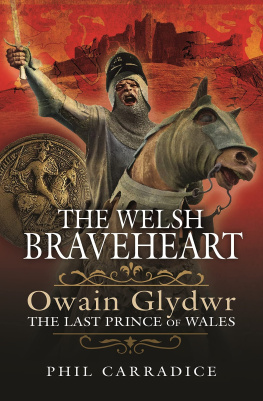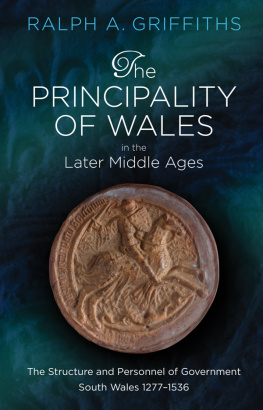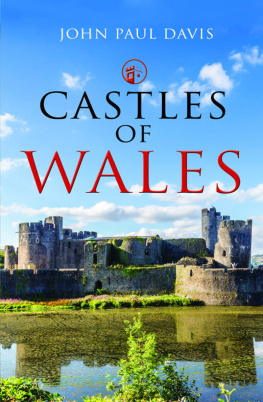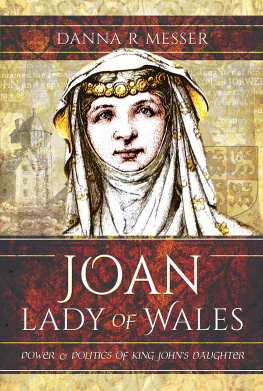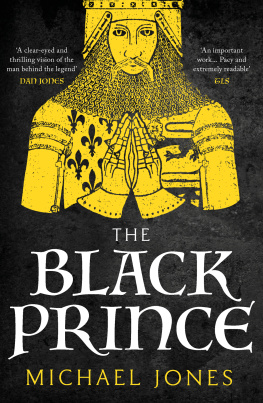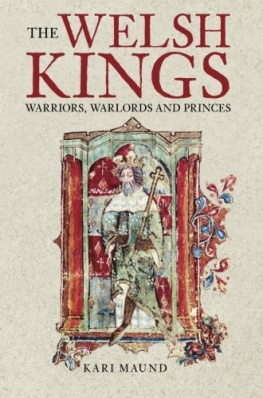Preface
T his volume has been written as a contribution to the study of a period of unique importance in the history of Wales. The policies pursued by the princes of the thirteenth century lend a coherence to the political history of the nation, and a significance to the course of Anglo-Welsh relations, hardly matched at any other time in the medieval centuries. The themes that suggest themselves for study in this period find their main focus in the person of Llywelyn ap Gruffudd, and a biographical study of the prince thereby becomes a means of approaching a historical record which, although still exceedingly sparse on several counts, provides a firm foundation for meaningful interpretation. A Welsh text, Llywelyn ap Gruffudd, Tywysog Cymru, published in 1986, was, rather surprisingly, the first attempt to make extensive use of the source materials in a study centred on the prince. The present volume is a new composition which, although it adheres to the plan and arguments of the first work, presents a somewhat enlarged discussion of several issues. The annotation, on occasion more extensive than I would wish, is in large part explained by the need to resolve matters raised in studying sources which, in many instances, have not hitherto been subjected to the critical examination they deserve, and it was often necessary to attend to problems of dating a document or to indicate the considerations which lie behind a statement made in the text.
I set out to write this book with a sense of great respect for the work of earlier scholars, both the authors of valuable historical discussions and those whose prodigious labours on the record sources have provided the edited texts on which so much medieval history is founded. My gratitude and admiration have deepened as this study progressed, and to a number of scholars I owe, besides the legacy of their written work, the great benefit of their kindness and generous encouragement. I owe to T. Jones Pierce and J. Goronwy Edwards, who guided my first efforts, both an inspiration and a discipline of enduring influence. I cherish the memory of my warm friendship with Hywel Emanuel, Glanville Jones, Thomas Jones, Gwyn Alfred Williams and Keith Williams-Jones, scholars of generous disposition and unbounded enthusiasm. My efforts have been eased by the comradeship of several kindred spirits, whose names recur in the acknowledgements to be found in the pages that follow, among them D. J. Bowen, A. D. Carr, T. M. Charles-Edwards, R. R. Davies, E. B. Fryde, R. A. Griffiths, Daniel Huws, Richard Ireland, Dafydd Jenkins, Huw Pryce, Bryn Roberts, Llinos Beverley Smith, David Walker, R. F. Walker and Glanmor Williams. I have been greatly rewarded by contact with scholars engaged in major work in progress. A critical edition of the court poetry of the period of the princes has been completed at the Centre for Advanced Welsh and Celtic Studies of the University of Wales, and I am grateful for the many kindnesses I have received from R. Geraint Gruffydd and J. E. Caerwyn Williams and, among their colleagues, Nerys Ann Jones and Ann Parry Owen. J. P. Clancy graciously allowed me to draw upon his translations of the poetry addressed to the princes, and I am indebted to Ann Parry Owen for translations of poems not yet available in English. A. J. Taylor shared with me his unrivalled knowledge of the record sources and military architecture of the conquest, and it is a pleasure to record my appreciation of his friendship over many years. A work on the financial records of the period 12824 which he initiated is now being edited by R. F. Walker and Susan J. Davies, and it has been a privilege to be associated with this venture. An edition of the acta of the princes is being prepared under the direction of Huw Pryce to whom, along with Kary Maund and Charles Insley, I am grateful for the first-fruits of another important scholarly contribution.
In bringing my study to completion I have incurred a number of particular debts that I am delighted to acknowledge. Huw Pryce, Huw Ridgeway and R. F. Walker showed great kindness in reading several chapters and in giving me, by their perceptive comments, the benefit of their intimate knowledge of the period. The work was read by two readers appointed by the Welsh Arts Council and their reports, quite apart from ensuring the award of a generous grant towards the cost of publication, conveyed a number of valuable suggestions. Tomos Roberts enabled me to gain access to the Melville Richards collection of place-names and drew unstintingly on his own knowledge in that field. John Simpson kindly undertook an investigation by which his specialist knowledge could be applied to an understanding of the situation in which the English army suffered a calamity in the tidal flow of the Menai Straits. I was able to discuss a number of problems, to my great advantage, with Paul Brand and David Carpenter, and the help of a number of other scholars with particular issues is acknowledged in the volume. I have found unfailing courtesy and friendship in libraries and record repositories, and particular thanks are due to the staff of the Hugh Owen Library, the National Library of Wales and the Public Record Office.
In preparing the volume for publication Rosemary Mills valiantly bore the brunt of transforming my execrable manuscript into a word-processed text, and I am also indebted to Delyth Fletcher and Gillian Parry. The maps were expertly prepared by Michael G. Jones to whom I am most grateful. I thank the University of Wales Press for undertaking publication, and I am especially indebted to the Director, Ned Thomas, and, for their great care in the production of the volume, to Susan Jenkins, Ceinwen Jones and those associated with them.
While the work was in its early stages I enjoyed tenure of the Sir John Rhs Visiting Fellowship of the University of Oxford, and I would like to acknowledge the hospitality and stimulating company of the Principal and Fellows of Jesus College, and especially that of my firm friend D. Ellis Evans. At the University of Wales Aberystwyth I had for many years a strong bond of friendship with my colleagues in the Department of Welsh History Ieuan Gwynedd Jones, Llinos Beverley Smith, Brian Howells, Geraint Jenkins and John Davies and I am grateful to them all for providing an extraordinarily friendly and supportive environment. Although this work was completed within a Department of History and Welsh History, I offer my volume in appreciation and encouragement of my colleagues continued commitment to the history of Wales. My association with the Royal Commission on the Ancient and Historical Monuments of Wales has given me, together with the fellowship of Commissioners and staff, a fuller awareness of the way in which the Royal Commission, Cadw: Welsh Historic Monuments, the Welsh Archaeo logical Trusts and others are enriching our knowledge of the buildings and landscape that would have been known to those whose aspirations and anxieties are the subject of this volume.


